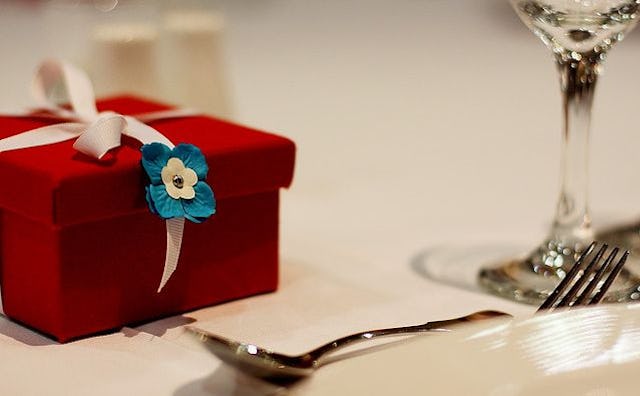There Are Three Stages of Gift-Giving in Relationships. Don't Muck It Up

There are three stages of gift-giving in romantic relationships, according to Russell W. Belk, a professor at York University in Toronto and a researcher in consumer behavior and gift-giving. Gift-giving should progress through these phases in order—getting ahead of yourself can be the kiss of death in a relationship. Below, how not to muck it up.RELATED: THE BEST, Non-Basic Gift Ideas For Your Boyfriend
Stage 1: The best Cubanos in town
“Economic exchange” is the early stages of dating. These are gifts selected primarily for their monetary value: taking a partner out for dinner at a cool restaurant or buying flowers, for example. They are gifts that implicitly demand reciprocity, that the giver and receiver will keep seeing each other, or perhaps that the receiver will buy dinner the next time.
Calibration here is important: Too much money spent can make the receiver feel they are incurring a debt they can’t or don’t want to pay back; too little money can signal the giver is not “investing” a lot in the potential relationship. Both parties in a budding relationship have concerns about being exploited, and appropriate gift-giving and -receiving can signal a level of respect and consideration that soothes those fears.
Stage 2: Pavement Tickets
“Social exchange” is the next stage—the moment when the “thought” of the gifts becomes more important. Perhaps one party might note that the other likes music and purchases concert tickets, or observes her admiring something in a shop window and goes back later to buy it. These gifts signal, “I am paying attention to you,” and are the next stage in forming a bond with a partner. “…Gifts are expected to be valued for their symbolic worth rather than their economic worth…” notes Dr. Belk in a paper published with co-author Gregory S. Coon in the Journal of Consumer Research. Their research shows that, for example, gifts bought the night before a holiday are not as valuable as gifts that demonstrate time and effort on the part of the giver.
“If partners have extremely different value systems, no level of satisfaction from sex, gifts, or companionship will hold the relationship together.”
Social-exchange-stage gifts are also a way of sussing out whether the two parties are compatible, not only in terms of taste (Do you like the sweater he bought you? Does he like the jacket you got him?) but also in terms of compatibility in material values.
As one subject in their study said, “Money should hold the same value system for both people when dating. If there are contradictions in the value money has, few gifts can be given or accepted without apprehension or disappointment over the estimated value of the gift. … If partners have extremely different value systems no level of satisfaction from sex, gifts, dating or companionship will be sufficient to hold the relationship together.”
Stage 3: A Telecaster
The third stage of dating is romantic love, when the gift-giving goes from being a statement of intent or a bid for affection to a more selfless consideration of only what the other person might want. Couples in the romantic-love stage of dating give gifts with less expectation of exchange and reciprocity and more in a spirit of altruistic giving: You’ve noted your partner is drooling over a new guitar in a catalog and, expense be damned, you’re going to get it for her because you know it will make her happy.
Drs. Belk and Coon note that gift-giving can be a minefield, and that givers and receivers will naturally feel some apprehension when they are unsure of their status. (They give a couple of examples of gifts-gone-awry in the social-exchange stage: one was a blouse the receiver felt indicated that the giver didn’t understand her taste; another was a gift of a kitchen appliance, which indicated to the receiver that the giver had certain…expectations of what their hypothetical married life might look like.)
“Nervous gift-giving is a product of not knowing where you stand.”
It’s clear that nervous gift-giving is a product of not knowing where you stand within the three stages: “Much of the anxiety of gift giving [while dating] appears to be due to uncertainty as to whether a dating partner is still operating within the economic exchange model or is operating within the social exchange model or romantic expressiveness model.”
In other words, it’s the transitions that must be delicately negotiated.
So what about long-married couples? I asked Dr. Belk in an email. What was he hoping to give or receive from his wife this holiday season? He replied, “We have more than enough stuff, so we are mostly giving to our daughter’s family rather than each other. Call it a fourth stage of mature post-material love.”
This article was originally published on